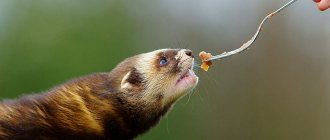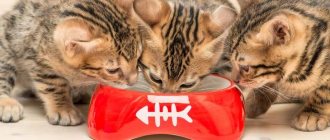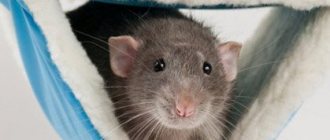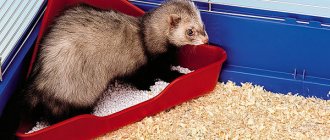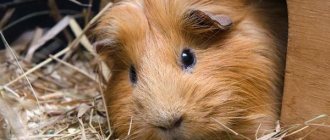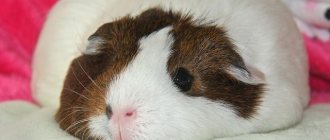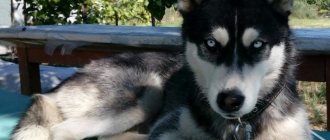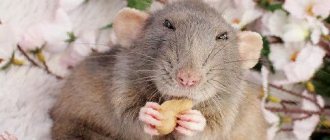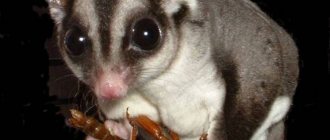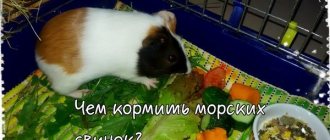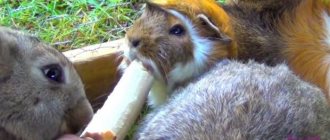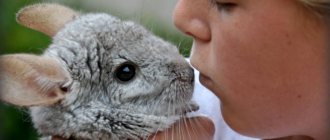The health and full life of ferrets depends entirely on proper feeding. If the diet is incorrect, this becomes the cause of various diseases and the pet’s life expectancy is significantly reduced.
Although the ferret belongs to the category of domestic animals, it cannot be compared with a cat and a dog. There are situations when ferret owners give their pets dog or cat food. This is strictly prohibited! The structure of the ferret's body is not at all similar to cats or dogs, its behavior is noticeably more active. All of this greatly affects your ferret's metabolism and metabolism. This is an animal with its own needs and needs to be fed only with special food.
The ferret has predator teeth that are designed to crush bones and tear off pieces of meat. These animals are by nature hunters of insects, birds and various rodents.
Feeding ferrets in nature
Ferrets are solitary hunters by nature. In the wild, these animals are predators and feed on rodents. The diet of ferrets consists of hamsters, ground squirrels, rabbits, field mice, rats, and gerbils. Ferrets easily catch lizards, frogs, and hunt poisonous snakes.
These animals have the ability to silently sneak up, ferrets attack hazel grouse, destroy bird nests on the ground in order to eat chicks and eggs. Ferrets' favorite delicacy is hedgehogs; their thorns do not frighten ferrets at all; they eat hedgehogs with great pleasure.
Ferret diet plan
When keeping ferrets, special attention should be paid to nutrition. After all, an incorrectly selected diet has a negative impact on health. Thanks to the wide variety of options, each breeder can choose the appropriate nutrition plan for himself.
Natural food
From natural products, ferrets are given meat - chicken or turkey, raw, with cartilage and bones, with the exception of tubular ones, and other offal. Breeders add dairy products other than milk to the diet because these animals are lactose intolerant.
Be careful with the fish. Not every type of fish is suitable for ferrets; animals are allowed to be given shrimp, squid, red fish - salmon, trout, but in small quantities.
Natural food should not be boiled; food should be given raw or defrosted.
Dry snacks
Food for ferrets, the ingredients of which include poultry meat containing easily digestible protein of non-vegetable origin - these are snacks. Currently, the market offers dry food, the composition of which was developed by specialists specifically for ferrets. The protein content in dry food is 32-36%, carbohydrates, fats - no more than 20%, up to 5% plant fibers.
In the absence of special food, you can purchase premium food for kittens and pregnant cats. Dog food is absolutely not suitable.
When feeding on dry food, your ferret drinks a lot of liquid, so you need to constantly ensure that the sippy cup is always filled with water.
Live food
Eating live food gives ferrets great pleasure. After all, by choosing such a scheme, breeders get as close as possible to the natural nutrition of these animals in nature.
The following are suitable live food, which is sold in veterinary pharmacies:
- mice;
- chickens;
- mealworms;
- marble cockroaches.
Treats
From time to time the ferrets are given various treats. Ferrets will eagerly eat cheese, cottage cheese, baby kefir and quail eggs, which can be present in the diet once a week. Pieces of fruit are allowed as treats, because ferrets really love apples, bananas, and pears.
Choose your ferrets' treats wisely; don't please them with treats from your table, as this will only cause harm. Indeed, in nature, plant food enters the body of these animals only if it is inside the caught prey.
Vitamins and supplements
For proper development and growth, ferrets need to be given vitamins and minerals. They are part of ready-made additives, which come in two types:
- vitamin pastes;
- vitamin complexes.
Pastes and complexes can be given to ferrets separately or added to food.
Vitamin paste helps animals recover faster, recover and regain strength after undergoing operations. Vitamin complexes are given to ferrets all year round, the dosage varies depending on the season, and the age of the animal is also taken into account.
The vitamins and minerals included in the supplements are important during shedding, lactation and estrus. The additives contain:
- minerals – calcium, phosphorus, magnesium, iron;
- A, E, D and other vitamins;
- Brewer's yeast.
Before choosing a vitamin supplement, be sure to consult a specialist.
Treats
Sometimes pets can be given treats at home, but they should eat them in limited quantities. Many owners of these animals often ask the question: can a ferret have a watermelon? This berry can be given to these animals, but as a reward and not too often. The following foods can also be given as treats;
- melon;
- pears;
- banana pieces;
- yoghurts;
- raisin;
- small hard pieces;
- oatmeal cookies;
- yoghurt sweets.
But whether a ferret can have milk is a controversial issue. But still, you should not give them this product. It is better to replace it with kefir, fermented baked milk, and yogurt.
Many treats for these animals can be purchased at pet stores. Moreover, these places provide a wide range of goodies that do not have a harmful effect on these animals.
But before giving these products, it is worth remembering that they are best used as a reward and in limited quantities. Still, the main part of the diet should consist of meat feed mixtures with a balanced composition. It is through these feeds that the full development of ferrets is ensured, and their vital energy is also maintained.
Farshekashi recipes
Farshekasha is a mixture that is often used to feed ferrets. It may contain several ingredients.
Recipe No. 1
Designed for young puppies and growing individuals. The composition of farshekashi includes:
- chicken stomachs – 1 kg;
- chicken necks – 2 kg;
- rice or buckwheat groats – 400 g.
The breeder presented the recipe for farshekashi in his video below:
Preparing farshekash is very simple:
- Grind the cereal into flour, then cook until completely cooked.
- Grind the offal into minced meat, which is mixed with the finished porridge.
- Add vitamins in the required quantities to the minced meat.
Recipe No. 2
This recipe is prepared for adult animals. Farshekasha consists of the following components:
- cottage cheese – 60 g;
- fish – 150 g;
- beef heart – 100 g;
- chicken meat – 0.5 kg;
- rice – 100 g;
- poultry fat – 10 g.
The cooking process is very simple:
- Cook the rice for 2-3 hours, grind the remaining ingredients into minced meat.
- Mix the resulting minced meat with porridge, add the necessary vitamins.
- Divide the finished minced meat into portions and place in the freezer.
Features of feeding in different periods
The diet of ferrets becomes special at certain periods of life. What remains common is the obligatory presence of minerals and vitamins.
Growth period
During breastfeeding, young ferrets receive the nutrients their bodies need through their mother's milk. Deprived of mother's milk, ferrets' gastrointestinal tract becomes vulnerable to infections, which is why probiotics should be kept in the breeder's medicine cabinet at all times.
Ferrets are transferred to “adult” feeding 3-4 weeks after birth. At this time, their baby teeth begin to erupt. In order for babies to quickly get used to this diet, liquid minced meat is introduced into the diet, and low-fat cream or baby kefir is added to the mother’s menu.
Don’t forget about vitamins - 3-4 drops of fish oil are dripped onto the tongue of ferrets. If more male furos were born in the litter, more calcium and phosphorus are added to the food, since males are more active.
Don't forget to give your pets vitamin pastes and supplements. Lack of nutrients negatively affects the growth and further development of ferrets.
Shedding period
Furo molt in early spring and autumn, with the exception of pregnant females who shed on the 20th day of pregnancy, and animals that have suffered a hormonal imbalance. Shedding lasts 1-2 weeks and is accompanied by severe itching. In some areas of the body there is practically no hair.
Ferrets are very clean, so they carefully lick themselves, as a result of which a lot of hair gets into the gastrointestinal tract and vomiting begins. To prevent this from happening, the animals are given fur-removing pastes. Pets are helped to cope with shedding by combing their fur with a brush or using a furminator.
During molting, ferrets need vitamin complexes containing sulfur, brewer's yeast and B vitamins. Thanks to which the new fur will be thick and shiny.
Pregnancy period
In order for the offspring to be born healthy, a pregnant female is given an individual diet.
The menu of a pregnant female must contain:
- phosphorus, calcium for strong teeth and bones;
- vitamins A, E, D and group B - in increased quantities.
When feeding chorihi with natural food, the menu includes meat and bone meal, calcined cottage cheese, and fish oil. If the female eats dry snacks, she is given special food for pregnant women or a product intended for cats. You can’t overfeed a choriha – this leads to obesity, but limiting the female’s nutrition is also dangerous.
Before childbirth and in the first days after it, the chorikha's appetite worsens. The ferret's menu during lactation is identical to the diet during pregnancy. Nutrient requirements are still high.
Health
A healthy ferret is always very active and actively plays with you. If this is not the case, it means he has some health problems. Proper care, a balanced diet and timely vaccinations will protect your pet from many diseases.
Possible diseases
If your pet doesn't want to play, it means he's sick:
Helminthiases . An animal infected with helminths does not grow or develop. If your pet is weak, has diarrhea or constipation, eczema and seizures, dull fur and a large belly, then he most likely has worms.
Such animals can easily become infected with infectious diseases due to reduced immunity. To avoid the appearance of helminths, the pet must be kept clean and monitored for nutrition, and given anthelmintic drugs once every six months.
Ectoparasites . The ferret must be protected from fleas, lice, ticks and lice. They greatly disturb the animal and are carriers of dangerous diseases.
Therefore, before a walk, it must be treated with special means that protect against these parasites.
If your pet still has them, you must immediately get rid of them step by step with the help of effective drugs from the pet store.
Aplastic anemia is a disease of both males and females. Characterized by prolonged estrus. A large amount of hormones is produced and anemia occurs. The animal loses its appetite and becomes lethargic.
Treatment is carried out only by a veterinarian. To avoid disease, you need to sterilize your ferret.
Animal vaccination
Even if you have given your pet all the necessary vaccinations, you should not think that now he will not get sick. It all depends on the condition of the animal and the quality of the vaccines administered:
- Rabies . Your ferret should be vaccinated against rabies every year. This disease is very dangerous for the central nervous system of the animal. It is necessary to seek help from a veterinarian as soon as possible.
- Plague of carnivores . The disease affects the mucous membranes of open and internal organs. It can be cured, but only in the early stages, so you need to contact a veterinary clinic as soon as possible.
- Contagious hepatitis, leptospirosis and parvovirus enteritis are also very dangerous diseases against which your pet ferret must be vaccinated.
After each vaccination, the ferret needs to be quarantined. At this time, he must be carefully monitored so as not to miss possible complications.
Ferret castration. Is this really necessary?
If you are not going to start breeding domestic ferrets, then they need to be neutered. So that in the future your pet does not suffer from hormonal imbalance.
Both sexes have their reproductive organs surgically removed. This must be done before the onset of the rut in males and the appearance of estrus in females, at approximately the age of 6 months.
How to choose dry food?
Before choosing dry food, be sure to read what components are listed in the composition. It is worth paying attention to the following points:
- Poultry meat should be listed first; if it is premium food, then there may be two types of meat.
- The content of plant fibers should be no more than 3-5%, since furo is difficult to digest fiber.
- The percentage of ash should not exceed 7%, otherwise the pet runs the risk of developing urolithiasis.
- The food should contain the amino acid taurine, which is good for the heart and eyes.
- It's best to avoid foods that contain cornmeal, especially if it's listed first.
Store-bought treats: are they worth buying?
So what kind of treats can you give your ferret? In the store, a variety of ferret treats (including cat food) immediately catch your eye. However, you should not immediately buy the first product you come across, as it can be dangerous for the animal, especially if it is abused.
First of all, you need to consult with a veterinarian what he thinks about this or that manufacturer, and also look at the packaging and read the ingredients. If the composition does not contain any meat components, and they are replaced by all kinds of sweeteners, fruits and grains, such treats will certainly not benefit the ferret.
What should you not give to ferrets?
There is a whole list of foods that should not be given to ferrets.
| Products | Why not? |
| Pork, lamb | These are fatty meats and are difficult to digest. |
| Pike, bream, pollock, herring, hake | The listed products contain trimethylamine oxide and thiaminase, which interfere with the absorption of vitamin B1. |
| Milk | This product is not digestible and loose stools may occur. |
| Citrus | Allergen, possible itching and rash. |
| Nuts | They are difficult to digest and can cause stomach blockage. |
Water in the diet
Ferrets often drink liquids, especially if they are fed dry snacks. With this diet, the number of approaches to the drinking bowl reaches 7-12 times. It is important to keep water bowls clean, and the water itself should be fresh, at room temperature. Filtered water is best for drinking and is changed at least 2 times a day.
Ferrets should always have water, because it not only promotes thermoregulation, but also saves the animal from sunstroke in the summer.
We create comfortable conditions for eating
Small ferrets should always have fresh water freely available. It must be changed at least once a day. Most of all, pets like to drink from regular bowls, although the cubs can accidentally knock them over or dirty them.
Ferrets love to dig and “extract” their food from the container, scattering it throughout the cage. The best way to prevent this is to use a deep cup or plastic plate mounted high enough on the side of the cage to make it inconvenient for the ferret to dig into it. If you have several pets, it is better to provide a dish for each.
Photo source:
Consequences of ferret malnutrition
The choice by breeders of feeds high in fat and carbohydrates, as well as feeding treats in large quantities, leads to the occurrence of various types of diseases, including:
- obesity;
- helminths;
- salmonellosis;
- insulinoma;
- enteritis;
- colitis;
- gastritis;
- pancreatitis;
- hypovitaminosis H, D.
We recommend that you additionally read our article about what diseases ferrets suffer from and how to treat them.
By providing their ferret with proper nutrition, breeders will have a healthy and active pet. Therefore, it is so important to pay special attention to the ferret’s diet and drinking regime, which can change at different periods of life.
0
0
Copy link
